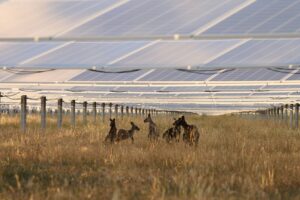
The price of large scale solar PV power plants has plunged to another record low as the latest auction for 800MW of solar capacity in the Gulf oil emirate of Dubai attracted the first ever bids below 3c/kWh ($US30/MWh).
The record was set in a bid from a consortium comprising Abu Dhabi renewable energy developer Masdar and Spanish developer FRV, which was acquired by Saudi Arabia’s Abdul Latif Jameel (ALJ) group in 2015, and which has built two large scale solar farms in Australia – the 20MW Royalla facility in the ACT and the 56MW Moree solar farm in NSW.
The bid of 2.99c/kWh (unsubsidised) beats all available fossil fuel options in Dubai, and astonishingly, is one half of the cost of a similar auction a year ago, when a winning bid of 5.84c/kWh by Saudi Arabia’s ACWA Power stunned the industry.
Since that time, however, the cost of solar has continued to plunge, with records being set in Chile, Peru and most recently Mexico, where Italian power giant Enel recently bid a price of 3.6c/kWh. In the US, solar tenders now regularly dip below 3c/kWh, although these include a 30% tax incentive and other subsidies.
The bid has huge implications for the power industry in the Middle East, North America, and around the world, with wind energy also breaking below 3c/kWh in an auction of wind energy capacity in Morocco earlier this year.
Saudi Arabia has recently announced it will build more than 9.5GW of renewable energy capacity as it prepares its economy for life beyond oil. Dubai is also investment heavily in solar as it seeks to diversify its energy sources away from oil and gas.
The later bid came in an auction for 800MW of capacity for the 800MW Sheikh Maktoum Solar Park, which could become the largest solar plant in the world, as well as the cheapest.
The pricing in Dubai is aided by low labour costs and cheap finance, but the fact that solar has halved in just 12 months points to a wider trend. Masdar is backed and owned by the Abu Dhabi sovereign wealth fund, which can access finance at rates no commercial bank can match.
The second lowest bid came from Chinese module maker and developer JinkoSolar at 3.69c/kWh, while ACWA Power and First Solar came in at 3.96c/kWh.
Two French-led consortia followed. Engie, which owns the ageing Hazelwood brown coal power station in Australia, which which predicts that half of all generation will come from distributed energy (local solar and battery storage) by 2040, bid 4.4c/kWh, while nuclear giant EdF bid 4.48c/kWh – less than half the cost of its controversial Hinkley C nuclear power station.
The bid comes amid a widespread re-appraisal of solar power, and the acceptance that it will form the basis of the world’s energy systems, possibly within a decade or two, because of its plunging costs.
Last week, Harvard researcher David Keith, a long-time critic of renewable energy and an avowed sceptic of solar who disbelieved the solar cost-curves, wrote a mea-culpa titled “I was wrong about the economic limitations of solar power”.
“I was wrong,” Keith said. “Facts have changed …. solar energy is very cheap and it can change the future of the global energy supply within a decade.”
German cleantech advisory group Apricum said the results of the bid “unequivocally demonstrate” that large-scale solar power can now regularly beat fossil-fuel power plants on cost.
It noted that as recently as October 2015, Dubai Electricity and Water Authority (DEWA) awarded the new Hassyan coal power station at a much higher tariff of 5.177c/kWh. Gas-fired generation in Dubai is even more expensive. As we noted last year, even at $US10/barrel, oil can’t match the price of solar. Make that $US5/barrel.








